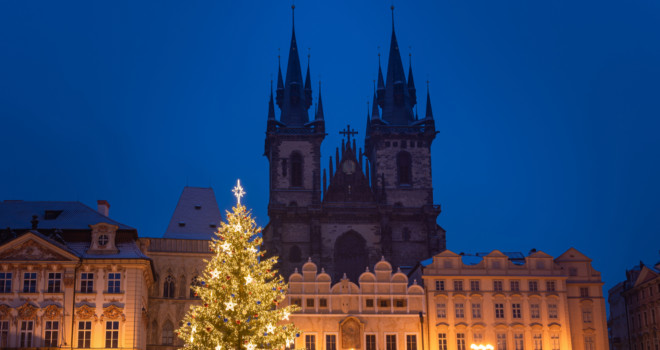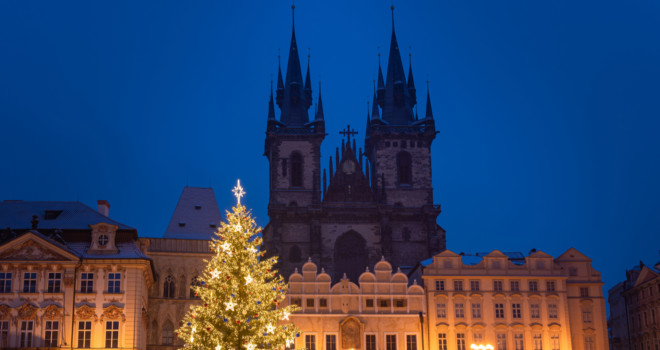Today we suffer from an onslaught of noise, and more than a little noise pollution! Not that noise is always bad, but it is true that the human heart, mind, and the soul longs for moments of silence. As we enter more deeply into Advent, now is a great time to learn to cultivate silence.
That first Christmas night is known as that Silent Night. The cold, dark night of the Nativity of Christ was cloaked in a most profound silence — the Silent Night that brought the Son of God from heaven to earth so that we might ascend from earth to heaven.
Even before this holy day, the great prophet Elijah arrived at the foot of the holy mountain. Where was God to be found? In the thunder and lightning, or in the fire, or in the wind and storm? In none of these was God to be found. Rather, God made Himself manifest in the gentle breeze that could hardly be heard by human ears.
The Benefits of Silence
Although many in the modern world flee from silence, it cannot be denied that silence has many positive benefits. Let us mention just a few.
1. The place to encounter God
In the midst of clamor and confusion, God cannot be encountered, but only in the center of a heart imbued and permeated with silence. Remember Elijah’s experience: God was encountered in the silence of the gentle breeze.
2. The Holy Spirit
After nine days and nine nights of prayer — which was done in silence with the Blessed Virgin Mary — the Holy Spirit came down upon the Apostles on that first Pentecost and the Church was born. Therefore, if we really want to experience the abiding presence of the Holy Spirit we urgently need silence.
3. Hearing God’s voice
The young Samuel in the Temple experienced the presence of God, but in silence. His response was: Speak, O Lord, for your servant is listening. God’s voice can be heard in the very depths of our soul in profound silence.
4. Interior peace
Excessive noise creates tension, anxiety, stress, and much more! When we can enter into the ambiance of silence it is then that God will help us to experience one of the sublime fruits of the Holy Spirit, and that is peace. The human heart yearns for interior peace more than all of the riches that the modern materialistic world can offer. Jesus’ Easter gift was shalom—peace be with you!
5. Learning to examine yourself
Only when we are alone with ourselves and at the same time alone with God will we be able to arrive at self-knowledge, to know who we really are—the noble as well as the ignoble, the virtuous as well as the vicious, the lights beaming in our lives as well as the ugly shadows that lurk in the inner recesses of our soul.
6. Repentance, forgiveness, and mercy
In silence, we can also examine our moral lives, how we are acting in the light of God. As a result, we can recognize our sins and bring them to God’s mercy through the Sacrament of Confession.
A prime example of this is the life of Saint Ignatius of Loyola. Being wounded in battle, he was forced into silence in his home town of Loyola. After this period of convalescence, Ignatius traveled as a pilgrim to the Sanctuary of Montserrat. While in this monastery, enveloped in silence, the future saint was able to enter deep into his conscience, examine it with great thoroughness, confess to a priest and receive absolution and forgiveness of his many sins. Had Ignatius not allowed himself to be absorbed and enveloped in silence, very likely this confession and conversion would never taken place!
7. Cultivate a habit of listening to others
Another positive fruit of a deep and efficacious silence in which we can hear the voice of God, examine our conscience, and repent deeply of our many transgressions, is an openness to listening to others in charity. Indeed, listening is an all-important art that few have really acquired. Listening demands patience, attention, humility, selflessness, and above all else charity—authentic love and concern for the other. A person who does not appreciate silence may find it difficult to listen with attention and charity towards others.
The best listener of all was Our Lord and Savior Jesus Christ. Jesus indeed spent the first thirty years of His life mostly in silence. In the home of Nazareth there was much silence. Working as a carpenter side by side with Saint Joseph, both worked most of the time absorbed in an eloquent silence.
8. Open to heavenly inspiration
Of enormous importance with respect to an attitude of silence is that of being open to God, most especially, being open to the inspirations that come from the Holy Spirit. Clatter, noise, boisterous environments, cacophony — all of these militate against an openness to God the Holy Spirit. Indeed, our God is a jealous God and will take second place to no person, place, or thing. If noise is predominant in our lives, then the Holy Spirit’s gentle but insistence voice — that we call inspiration — will never be heard. The Holy Spirit is our Best Friend, as well as the Interior Master, and also the Sweet Guest of the soul. Let us live a life of recollection and silence so as to hear more frequently His sweet, gentle, and consoling inspirations.
9. Probing the depths of our mind
If we apply ourselves to frequent moments of silence we can arrive at a deeper thought life, which will be accompanied by the proper use of our reason, and result in making good decisions that will bless ourselves as well as others. Einstein, Dante, Shakespeare, Augustine, and Aquinas—all of these profound thinkers spent long blocks of time in silence in which they could cultivate the profound intellects God had given them.
10. Imitation of Mary
Our Lady has many titles. She is the Daughter of the Father, the Mother of the Son, the Mystical Spouse of the Holy Spirit, the Masterpiece of creation! Mary had a deep mystical and contemplative life and this was only possible because she relished long periods of silence. God sent the Archangel Gabriel to Mary when she was absorbed in silence, absorbed in prayer.
May we imitate Mary and relish silence so that God can take us into the desert and speak to the depths of our hearts.
✠












